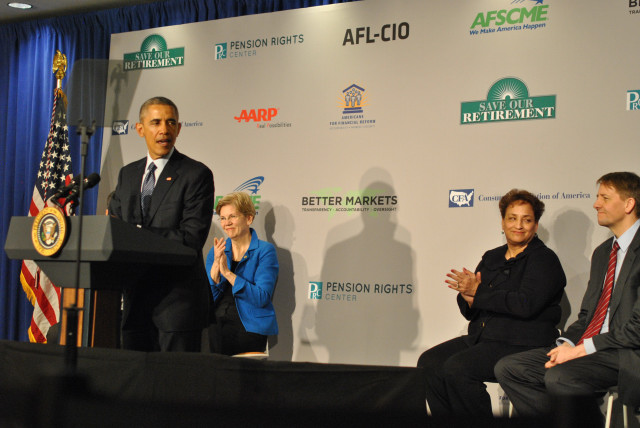
As House Holds Oversight Hearing, 340 Groups Call For Defense of CFPB
Today, Consumer Financial Protection Bureau Director Richard Cordray will present the CFPB's sixth semi-annual report to the House Financial Services Committee, whose majority members have been harsh critics of the successful consumer agency. Americans for Financial Reform, joined by the state PIRGs and a total of 340 national, state and local groups, sent Congress a letter explaining why the idea of the CFPB needs no defense, only more defenders.

Last week, I captured a photo of the President, with CFPB architect and now U.S. Senator Elizabeth Warren (MA) directly behind him, as he gave a well-deserved shoutout to the CFPB and its director Rich Cordray (far right) at an event launching a new initative to protect retirement savings against Wall Street tricks. Today, Consumer Financial Protection Bureau Director Richard Cordray will present the CFPB’s sixth Semi-Annual Report to Congress at a hearing of the full House Financial Services Committee (2:30 PM ET), whose majority members have often been harsh critics of the successful consumer agency. Among the members’ complaints is that the agency is “out-of-control” and “lacks oversight.” Neither of these claims is true. In fact, Director Cordray will highlight the number of times he or bureau officials have been before Congress in the now 3-and-one-half-years since the CFPB became the nation’s chief consumer financial regulator. Of all financial regulators, in fact, only the Federal Reserve Board and the CFPB are required to submit Semi-Annual Reports to the House and Senate. Director Cordray will also talk about the gains that the CFPB — established as a centerpiece of the 2010 Wall Street Reform and Consumer Protection Act — has made on behalf of American consumers, who are still recovering, along with the economy, from the Wall-Street caused financial collapse of 2008.
In preparation for the hearing, Americans for Financial Reform, joined by the state PIRGs and a total of 340 national, state and local groups, sent Congress a letter explaining why the idea of the CFPB needs no defense, only more defenders. Here is an excerpt:
“Since [July 2011], the CFPB has been protecting consumers by ensuring that markets work in an open, transparent, and fair way. The Bureau’s mission is to hold financial companies accountable for being upfront about the costs of, and risks associated with, their products, and also to ensure that consumers are treated with dignity and respect, rather than set up to fail. The Bureau has successfully gone to bat for consumers, delivering results that are making markets work more fairly and putting a stop to fraud and abuse. The CFPB has recovered billions of dollars in restitution for consumers, from Servicemembers to credit card holders. The Bureau has done this through their investigation of various companies for potential violations of consumer financial laws. In total, CFPB enforcements have resulted in over $4.6 billion returned to over 12 million people who have been harmed by illegal, deceptive, and discriminatory practices of various companies.
In addition to enforcement actions that stop bad behavior and return ill-gotten gains directly to the consumers who were victims of tricks and traps in the marketplace (consumers do not need to apply, fill out forms, or otherwise prove anything; if the money was wrongly taken, the CFPB simply orders banks or others to put it back in consumer accounts), the CFPB has of course been active in drafting new rules of the road for the marketplace, developing educational programs for everyone from servicemembers to students to homebuyers, handling consumer complaints and making marketplace activities and its own activities more transparent through a regular series of reports, snapshots, public hearings, webinars and a searchable public database of consumer complaints. The CFPB’s comprehensive Semi-Annual Report (191-page pdf) has more. So does its website (consumerfinance.gov or cfpb.gov both work), which includes a newsroom, a searchable database of complaints, a complaint portal and innumerable other tools for consumers (click the Get Assistance” menu on the home page) and social service providers, as well as a Spanish-language mirror site (and help in over 180 languages).
Nevertheless, powerful special interests, including the banks and credit unions and their many trade associations, as well as payday and high cost lenders, financial services lawyers and lobbyists, debt collectors and credit bureaus, mortgage companies, for-profit trade schools and auto finance companies, joined by generally coin-operated “free market” think tanks and other special interests, continue to try to rev up Congressional opposition to the CFPB. AFR estimates they’ve been spending $1.8 million per day to roll back Wall Street reform. As our letter continues:
The rollback proposals that have been debated in the past—and which we expect will be raised again in the new Congress—will not protect the public or increase agency accountability. Instead, these proposals would hamper the agency and interfere with its ability to fulfill its mission. The arguments to support them are part of a pattern of mischaracterizing the CFPB’s organization and processes. Unfortunately, opponents of consumer protection—including portions of the financial services industry that opposed the creation of the Bureau—have opposed its consumer protection efforts at every step, and possess a narrow self-interest in preventing effective consumer regulation. We strongly urge members of Congress to refrain from placing those narrow industry interests above the vital public interest in regulation of the consumer finance market place.”
Legislative attacks on the bureau can be grouped into three categories. Some bills aim to radically change its structure or eliminate the independent funding that insulates it from special interest efforts; the goal, to starve it to death or otherwise cut off its head. Other opposition ploys use a death by a thousand cuts strategy. Finally, the bureau is one of many agencies that would see its effectiveness diminish if any of a package of U.S. Chamber of Commerce “analysis-paralysis” proposals were enacted that are intended to prevent agencies from issuing any health, safety or pocketbook protection rules in less than geologic time.
The CFPB is also currently carefully considering a number of very important rules to make the marketplace work better. It is studying the growing, but largely unregulated, pre-paid accounts and cards market (comments due 23 March). It has proposed to make the excellent public consumer complaint database even better by adding consumer stories (comment period closed). Next week, it holds a field hearing in Newark where it is expected to announce a final report on the impact of small print forced arbitration requirements that limit the ability of consumers to go to court to obtain redress when abused by unfair financial marketplace practices. Under law, upon completion of a report to Congress, the CFPB gains authority to draft a rule restricting pre-dispute arbitration (no one is against fair arbitration agreements, entered into only after a dispute has arisen).
The CFPB works. And it works for all of us, including good actors and fair dealers in the marketplace. You can learn more about its activities at its website or in the semi-annual report. As our joint letter to Congress concludes:
We see an agency responsibly undertaking the job given to it by Congress: making consumer financial markets fairer and more transparent, putting money back in the pockets of members of the public who were fleeced by illegal conduct, and policing rules of the road that make the financial system work better for responsible businesses and responsible consumers alike. Obstructing basic rules of the road only serves the interests of the worst elements of the financial industry, and also encourages law-breaking. We urge members of Congress to support the CFPB in fulfilling its consumer protection mission, rather than undermine it, and to use its time to explore ways to move forward on making sure that the U.S. financial system supports people’s ability to save, transact, and borrow prudently.
The idea of the CFPB needs no defense, only more defenders.
Topics
Authors
Ed Mierzwinski
Senior Director, Federal Consumer Program, PIRG
Ed oversees U.S. PIRG’s federal consumer program, helping to lead national efforts to improve consumer credit reporting laws, identity theft protections, product safety regulations and more. Ed is co-founder and continuing leader of the coalition, Americans For Financial Reform, which fought for the Dodd-Frank Wall Street Reform and Consumer Protection Act of 2010, including as its centerpiece the Consumer Financial Protection Bureau. He was awarded the Consumer Federation of America's Esther Peterson Consumer Service Award in 2006, Privacy International's Brandeis Award in 2003, and numerous annual "Top Lobbyist" awards from The Hill and other outlets. Ed lives in Virginia, and on weekends he enjoys biking with friends on the many local bicycle trails.
Find Out More

Apple AirPods are designed to die: Here’s what you should know

New report reveals widespread presence of plastic chemicals in our food

Have medical expenses impacted your credit score?

